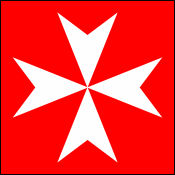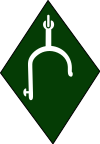231st Brigade (United Kingdom)
| 231st Brigade 231st Independent Infantry Brigade 231st Infantry Brigade |
|
|---|---|

Formation sign of the 231st Independent Infantry Brigade while in Malta and shortly after.
|
|
| Active | 14 January 1917 – 10 July 1919 1943–1945 |
| Country |
|
| Branch |
|
| Type | Infantry |
| Size | Brigade |
| Part of |
74th (Yeomanry) Division 50th (Northumbrian) Infantry Division |
| Engagements |
World War I World War II |
| Commanders | |
| Notable commanders |
Roy Urquhart Alfred Dudley Ward Sir Alexander Stanier |
| Insignia | |
| Identification symbol |
 Formation sign of the 231st Brigade when part of the 74th (Yeomanry) Division in World War 1, (a broken spur). |
| Identification symbol |
 When serving with the 50th (Northumbrian) Infantry Division. |
The 231st Brigade was an infantry brigade of the British Army that saw active service in both World War I and World War II. In each case it was formed by redesignation of existing formations. In the World War I it fought in Palestine and on the Western Front, while in World War II it served in the Allied invasion of Sicily, Italy and the Normandy landings of 6 June 1944.
In March 1916 the South Wales Mounted Brigade and Welsh Border Mounted Brigade, both composed of Yeomanry regiments of the Territorial Force in 1st Mounted Division, were dismounted and sent to Egypt to serve as infantry. Together, they formed 4th Dismounted Brigade. Between January and March 1917 the small Yeomanry regiments were amalgamated and numbered as battalions of infantry regiments recruiting from the same districts. The brigade was renumbered 231st Brigade and joined 74th (Yeomanry) Division in the first week of April 1917.
231st Brigade was constituted as follows during the First World War:
The following officers commanded 231st Brigade during the First World War:
Shortly after joining 74th Division, the brigade took part in the Second Battle of Gaza (17–19 April 1917). Then in the autumn it fought in the Third Battle of Gaza (27 October – 7 November) including the Battle of Beersheba (31 October) and the capture of the Sheria Position (6 November). Shortly afterwards it was involved in the Capture of Jerusalem (8–9 December) and its subsequent defence (27–30 December). In March 1918, the brigade was in the Battle of Tel 'Asur, but shortly afterwards was warned that it was to move to France, where reinforcements were urgently required to stem the German Spring Offensive.
...
Wikipedia
